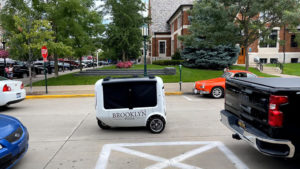Canada’s largest Tier 1 parts maker and vehicle assembly company is making a big bet on autonomous delivery robots

Magna International is developing last-mile autonomous delivery technology and has launched a new pilot program utilizing purpose-built, on-road, lightweight, electric robots in Detroit. Photo: Magna International
Canada’s largest Tier 1 auto parts maker and vehicle assembly company is making a big bet on autonomous delivery robots
Magna International is developing last-mile autonomous delivery technology through a new pilot program utilizing an electric pizza delivery robot in Detroit.
Magna, a Canadian auto parts supplier, says its new micro-mobility solution will enable retailers and other stakeholders to offer end-to-end, last-mile autonomous delivery opportunities around delivering restaurant orders and e-commerce products.
“The pilot is serving as a proof-of-concept last mile delivery solution for urban environments,” says Matteo Del Sorbo, executive vice president, Magna International and global lead for Magna New Mobility in an email to Electric Autonomy Canada.
So far, the fully autonomous robot has successfully delivered hundreds of pizzas while also giving Magna vehicle data and consumer feedback to improve the overall operations.
“We have received a lot of positive feedback from customers about the pizza delivery robot, and also gained a lot of experience and learnings,” says Del Sorbo. “In principle, delivering pizzas may seem like an easy task but it is quite complex. For example, the team used real-world feedback to simplify the process by which end customers retrieve their pizzas from the robot and adapted to challenges like delivering to an office building that may contain multiple businesses at one street address.”
The electric robot can travel at speeds of up to 20 mph on public roads and is integrated with Magna’s low-speed autonomous driving system — which includes cameras, radar, LiDAR and other hardware — and delivery software.
Pizzas are just the first step
For the Detroit pilot, the electric robot is being used to deliver pizza from a local restaurant in the area. The pilot started in March 2022 and will continue into 2023.
But Magna sees many more possibilities for autonomous last-mile delivery.
“Expanding into the growing world of new mobility is a key part of our ‘Go Forward’ strategy that takes Magna beyond its existing technical strength in automotive and vehicle systems, and into entirely new markets and business models. It aligns with our vision to advance mobility for everyone and everything,” says Del Sorbo.
“Areas like last-mile delivery will become an important part of our economy as well as our everyday lives – to meet the ever-growing demand for home deliveries. Solutions like our last-mile, autonomous delivery robots can help to reduce costs and at the same time represent an environmentally friendly solution to the mobility ecosystem.”
The next phase of the pilot will be to apply the learnings to further engineer the product, research full production and figure out how to scale the technology in order to deploy it across a broader range of applications and use cases.
Along with launching a pilot, Magna has also agreed to manufacture a fleet of autonomous delivery robots for last-mile delivery for San Francisco-based autonomous robotics company, Cartken. Magna has also invested $77 million into Yulu, India’s largest electrified shared mobility provider to expand into the micro-mobility market.
Building autonomous delivery robots for Cartken
“Our mission is to advance mobility for everyone and everything – and to do it responsibly. Our recent announcements all center around bringing sustainable, low cost and efficient solutions to market,” says Del Sorbo.
“As we develop new solutions in the mobility landscape, we will have software and service offerings enabled by our hardware that also provides opportunities to unlock new business models.”
As part of the agreement with Cartken, Magna will be in charge of manufacturing “thousands” of Cartken’s Model C autonomous robots, based on Cartken’s forecast. Production on the Model C robots has already begun at a Magna facility in Michigan and is anticipated to ramp up in the coming months.
The Model Cs are fully autonomous and equipped with remote monitoring and teleoperation. The system allows for a human override if needed.
They can operate both indoors and outdoors and have been deployed for a number of different autonomous delivery use cases, including in malls, hotels, universities, retail, back-of-house, and warehouses around the globe.
“We seek strategic partners that can accelerate the trajectory of Cartken’s growth. This partnership is a significant step toward scaling our business and getting more Model C’s into the world,” said Christian Bersch, Co-founder and CEO of Cartken in press note.
Battery-as-a-Service with Yulu
Meanwhile, the India-based shared mobility provider, Yulu currently has in service and operations more than 10,000 shareable, low-speed, electric two-wheelers in Bangalore, Delhi and Mumbai. The company aims to promote accessible, sustainable urban mobility in the country.
Together with Magna, the two companies are also launching a new battery-swapping service venture, called Yulu Energy.
“A battery swapping service is where users of electric two-wheelers can swap their batteries at certain swapping stations,” explains Del Sorbo.
Magna will be the exclusive battery-swapping provider for Yulu’s customers and handle all the “future buildup of the infrastructure required for millions of swaps per week.”
“People will no longer have to worry about range and any downtime required to charge batteries. Our battery swapping entity with Yulu supports the rapid growth in the electrification in mobility and the associated required infrastructure,” says Del Sorbo.
Since investing in Yulu, Magna will have a stake in the company and hold a seat on Yulu’s board of directors.






